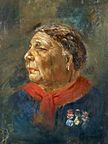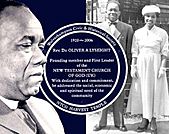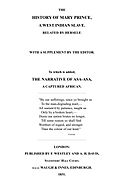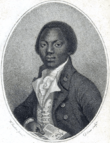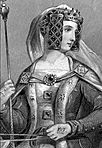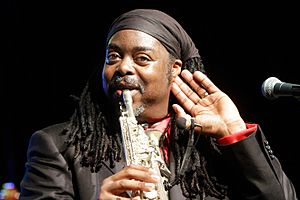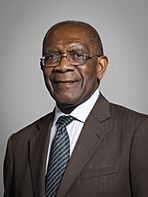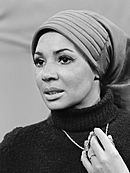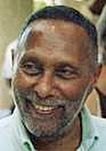100 Great Black Britons facts for kids
100 Great Black Britons is a special project that started in 2003. Its goal was to celebrate and vote for the most important Black British people in history. This project began because a BBC poll called 100 Greatest Britons didn't include any Black Britons. Patrick Vernon started the campaign to fix this. In February 2004, Mary Seacole, a brave nurse, was voted the greatest Black Briton. The 100 Great Black Britons project was updated and relaunched in 2020 with new public voting and a book.
Contents
Why the 2003 Poll Happened
In 2002, the BBC ran a TV show and poll called 100 Greatest Britons. They defined a "great Briton" as anyone born or living in the British Isles who made a big difference. Winston Churchill was voted the "greatest Briton ever." However, many people criticized the poll because it wasn't very diverse. Out of 100 people, only 13 were women, and none were Black.
Because no Black people were on the BBC's list, Patrick Vernon started his own campaign called 100 Great Black Britons. He launched it in October 2003 during Black History Month. His aim was to "show how much Black people have helped Britain." Vernon explained that Black history often isn't recognized. He said, "We didn't just arrive with the Windrush in 1948 – we've been here for a thousand years." He wanted to show that Black people have always shaped Britain. The poll also aimed to provide role models for young Black Britons. More than 100,000 people voted online, choosing from many Black figures from history and today. This poll was seen as a very important moment for recognizing the contributions of people of African and Caribbean descent in British history.
Mary Seacole, a nurse who helped soldiers during the Crimean War, came first in the 2003 poll. Her important work was often overlooked in history books, especially compared to Florence Nightingale. The list also included musicians, politicians, media stars, religious leaders, and even royalty. Because of the poll, some Black historical figures were added to school lessons. Blue plaques were put up to remember some people on the list. A statue of Mary Seacole was even put in the garden of St Thomas' Hospital in London. In 2020, people asked for a temporary hospital in Birmingham to be named after Mary Seacole, just like a London hospital was named after Florence Nightingale.
Some Disagreements
Not everyone agreed with the poll. Paul Phoenix, from Black Parents in Education, thought the poll just copied the BBC's idea. He said, "Why do we always have to react to what other people do? We should celebrate our heroes every single day." But Sam Walker, from the Black Cultural Archives, supported the poll. He said it didn't matter if it was a copycat idea, just like Black History Month itself came from America and has been very helpful.
There was also some debate about including Queen Philippa of Hainault on the list. Historians disagree if she was "black" in the modern sense. She was mostly European, with some distant Armenian and Cuman (Turkic/Asian) family members. An old report from around 1319 described her or one of her sisters as "brown of skin." But it's not clear what this meant back then. All her known portraits show her as white. Historian Kathryn Warner believes she was "a European woman and definitely not of African ancestry."
2003 Poll: Top 10 Results
| Rank | Name | image | What They Are Known For |
|---|---|---|---|
| 1 | Mary Seacole (1805–1881) | Mary Seacole was a British-Jamaican nurse and businesswoman. She set up the "British Hotel" to help soldiers during the Crimean War. She used herbal remedies to care for sick soldiers. Her book, Wonderful Adventures of Mrs Seacole in Many Lands, is one of the first books written by a mixed-race woman. | |
| 2 = | Bishop Wilfred Wood (born 1936) | Wilfred Wood was the Bishop of Croydon from 1985 to 2003. He was the first Black bishop in the Church of England. He was honored by the Queen for his work in improving race relations in the UK. | |
| 2 = | Dr Oliver Lyseight (1919–2006) | Dr Oliver Lyseight came to England from Jamaica in 1951. He founded one of Britain's largest Black churches. He was a spiritual leader for the "Windrush generation" – the first Caribbean people to move to Britain after World War II. | |
| 3 | Mary Prince (1788–1833) | Mary Prince was an important writer and abolitionist (someone who fought to end slavery). Born into slavery in Bermuda, she escaped and wrote her life story, The History of Mary Prince (1831). This was the first book by a Black woman published in the UK. Her story helped the anti-slavery movement. | |
| 4 | Olaudah Equiano (1745–1797) | Olaudah Equiano was a writer and abolitionist. He was kidnapped and enslaved as a child. He bought his freedom in 1766. In London, he joined the fight against slavery. His book, The Interesting Narrative of the Life of Olaudah Equiano (1789), showed the horrors of slavery and helped end the slave trade in Britain. | |
| 5 | Philippa of Hainault (1310/15 – 1369) | Philippa of Hainault was the Queen of England, married to King Edward III. She was very popular for her kindness and helped keep peace in England. She often traveled with her husband and even acted as queen when he was away. Her inclusion on this list has been debated by historians. | |
| 6 | Courtney Pine (born 1964) | Courtney Pine is a famous British jazz musician. He helped start the Black British band the Jazz Warriors in the 1980s. He mainly plays the saxophone but also plays other instruments like the flute and clarinet. | |
| 7 = | Sir Bill Morris (born 1938) | Sir Bill Morris is a former British trade union leader. He was the head of the Transport and General Workers' Union from 1992 to 2003. He was the first Black leader of a major British trade union. He is now a member of the House of Lords. | |
| 7 = | Sir Trevor McDonald (born 1939) | Sir Trevor McDonald is a well-known British newsreader and journalist. He is famous for his long career with ITN news. He was knighted in 1999 for his services to journalism. | |
| 8 | Shirley Bassey (born 1937) | Dame Shirley Bassey is a Welsh singer known for her powerful voice. She sang the theme songs for three James Bond films: Goldfinger, Diamonds Are Forever, and Moonraker. She was made a Dame in 2000 for her contributions to performing arts. | |
| 9 | Bernie Grant (1944–2000) | Bernie Grant was a British politician for the Labour Party. He was a Member of Parliament for Tottenham from 1987 until his death. He was one of the first Black British MPs, elected at the same time as Diane Abbott and Paul Boateng. The Bernie Grant Arts Centre in London is named after him. | |
| 10 | Professor Stuart Hall (1932–2014) | Professor Stuart Hall was a Jamaican-born British sociologist and cultural theorist. He helped start the field of British Cultural Studies. He explored how race and gender are part of culture. He was also involved in the Black Arts Movement. |
2003 Poll: The Full List
- Diane Abbott
- Ira Aldridge
- Dounne Alexander
- Baroness Valerie Amos
- Viv Anderson
- John Archer
- Joan Armatrading
- Jennette Arnold
- Jazzie B
- Francis Barber
- John Barnes
- Dame Jocelyn Barrow
- Dame Shirley Bassey
- Brendan Batson
- Floella Benjamin
- Nigel Benn
- Patrick Berry
- Oswald Boateng
- Paul Boateng
- Nana Bonsu
- George Bridgetower
- Yvonne Brewster
- Errol Brown
- Elizabeth Barrett Browning
- Frank Bruno
- Naomi Campbell
- David Case
- Queen Charlotte
- Linford Christie
- Samuel Coleridge-Taylor
- Lord Leary Constantine
- John Conteh
- William Cuffay
- Ottobah Cuguano
- Craig David
- Des'ree
- Desmond Douglas
- Niger Val Dub
- Ms. Dynamite
- John Edmonstone
- Olaudah Equiano
- Chris Eubank
- Michael Fuller
- Gabrielle
- Len Garrison
- Goldie
- Bernie Grant
- Jeremy Guscott
- Professor Stuart Hall
- Al Hamilton
- Ellery Hanley
- Sir Lenny Henry
- Peter Herbert
- Baroness Roselind Howells
- Paul Ince
- Colin Jackson
- Lee Jasper
- Linton Kwesi Johnson
- Claudia Jones
- Janet Kay
- Kanya King
- Baroness Oona King
- Beverley Knight
- Cleo Laine
- David Lammy
- Stephen Lawrence
- Angie Le Mar
- Denise Lewis
- Lennox Lewis
- George of Lydda
- Phil Lynott
- Dr. O. A. Lyseight
- Val McCalla
- Sir Trevor McDonald
- Paul McGrath
- Dr. Harold Moody
- Lord Bill Morris
- Martin Offiah
- Chris Ofili
- Ben Okri
- Bruce Oldfield
- Lord Herman Ouseley
- Mica Paris
- Queen Philippa
- Trevor Phillips
- Courtney Pine
- Lord David Pitt
- Mary Prince
- Sade
- Ignatius Sancho
- Tessa Sanderson
- Baroness Patricia Scotland
- Mary Seacole
- Seal
- Emperor Septimius Severus
- Zadie Smith
- Julius Soubise
- Moira Stuart
- Lord John Taylor
- Caroll Thompson
- Daley Thompson
- Randolph Turpin
- Rudolph Walker
- Andrew Watson
- Robert Wedderburn
- Arthur Wharton
- Willard White
- Henry Sylvester Williams
- Bishop Wilfred Wood
- Ian Wright
- Benjamin Zephaniah
The 2019–2020 Relaunch
In 2019, the 100 Great Black Britons poll was relaunched. This happened 16 years after the first one. The reason was that many people still didn't know much about Black British culture and history. Events like the "Windrush scandal" and the Brexit referendum also showed a need for this. Patrick Vernon and Dr Angeline Osborne relaunched the campaign. They wanted to celebrate Black people's achievements and make sure they weren't forgotten. New Black British historical figures had been discovered since 2003, and new role models had appeared. The public was asked to nominate their most admired Black Britons in different areas.
As part of the new campaign, children and young people were encouraged to learn about Black British history. They could explore the lasting impact and achievements of Black people in Britain. The National Education Union (NEU) supported a competition for schools. Kevin Courtney, from the NEU, said that Britain's history is "rooted in black and global history." Schools were encouraged to have students dress up as their favorite Black Briton, create projects, or write essays. Arike Oke, from the Black Cultural Archives, said the website's resources help families teach children about their history.
The results of the updated poll were put into a new book published in September 2020. The 2020 list was chosen by a panel after thousands of nominations from the public. Vernon said it "could easily have been called 1,000 Great Black Britons" because of how many nominations they received. The book includes biographies of the top 100. These people made big contributions in arts, science, business, and other areas. They also used their positions to help the Black community. The book was very popular, even before it was officially released. A campaign was started to send a copy of the book to every secondary school. This happened while people were asking for Black history to be added to the National Curriculum.
The 2020 List
Unlike the first list, the 2020 list is not ranked in order:
- Diane Abbott
- Victor Adebowale
- Ade Adepitan
- Dr Maggie Aderin-Pocock
- Professor Hakim Adi
- Sir David Adjaye
- John Agard
- Akala
- John Akomfrah
- Ira Aldridge
- Valerie Amos
- Kehinde Andrews
- Professor Dame Elizabeth Anionwu
- Dr Elaine Arnold
- Amma Asante
- Winifred Atwell
- Dame Jocelyn Barrow
- Colour Sergeant Johnson Beharry
- Floella Benjamin
- Munroe Bergdorf
- Jak Beula
- Karen Blackett
- Malorie Blackman
- John Blanke
- Dennis Bovell
- Sonia Boyce
- Dr Aggrey Burke
- Vanley Burke
- Margaret Busby
- Dawn Butler
- Earl Cameron
- Betty Campbell
- Naomi Campbell
- Queen Charlotte
- Edric Connor
- Lloyd Coxsone
- William Cuffay
- Quobna Ottobah Cugoano
- William Davidson
- Dame Linda Dobbs
- John Edmonstone
- Idris Elba
- Edward Enninful
- Olaudah Equiano
- Bernardine Evaristo
- Sir Mohamed Muktar Jama Farah
- Lenford Kwesi Garrison
- George the Poet
- Paul Gilroy
- Bernie Grant
- Stuart Hall
- Sir Lewis Hamilton
- Sir Lenny Henry
- Lubaina Himid
- Dame Kelly Holmes
- Darcus Howe
- Rose Hudson-Wilkin
- Eric Huntley and Jessica Huntley
- Professor Gus John
- Linton Kwesi Johnson
- Claudia Jones
- Sheku Kanneh-Mason
- Jackie Kay
- Sam King
- Kwame Kwei-Armah
- John La Rose
- David Lammy
- Marai Larasi
- Doreen Lawrence
- Andrea Levy
- Sir Steve McQueen
- Thomas Molyneux
- Dr Harold Moody
- Olive Morris
- Grace Nichols
- Chi-chi Nwanoku
- David Olusoga
- Phyllis Opoku-Gyimah
- Olivette Otele
- Horace Ové
- Elsie Owusu
- David Oyelowo
- George Padmore
- Professor Sir Geoff Palmer
- Alex Pascall
- David Pitt, Baron Pitt of Hampstead
- Mary Prince
- Marvin Rees
- Bill Richmond
- Marcia Rigg
- Ignatius Sancho
- Stafford Scott
- Mary Seacole
- Menelik Shabazz
- Yinka Shonibare
- Paul Stephenson
- Stormzy
- Robert Wedderburn
- Dame Sharon White
- Henry Sylvester Williams
- Allan Wilmot
- Simon Woolley
- Gary Younge
- Benjamin Zephaniah
Book
- Patrick Vernon and Angelina Osborne, 100 Great Black Britons. Foreword by David Olusoga. London: Robinson, 2020, ISBN: 1472144309.
See also
 | William Lucy |
 | Charles Hayes |
 | Cleveland Robinson |


